A few years ago, I published this post detailing how I “got into coffee” (aka started to understand the subtleties of coffee) as a complete beginner.
From the moment I started drinking coffee, I thought it needed to be loaded with sugar or milk or just downright bitter, and that simply isn’t the case.
Coffee can be fruity, juicy, chocolatey, rich, creamy, and most importantly balanced! And when you have a cup of coffee like that? Wow. Nothing better.
For being a morning (and afternoon… and maybe even evening) staple, coffee is a very nuanced drink. There are a lot of elements that impact the flavor you extract from the beans themselves, and that’s what we’re chatting about today!
If your coffee doesn’t taste quite “right,” it probably tastes either sour or bitter.
Those are the two extremes of the coffee-flavor scale. So if you’re reading this while sipping on a freshly-brewed cup of joe, take a big ol’ sip and ask yourself if:
- It tastes weak, chemically, or acidic (aka sour)
- It tastes burnt, acrid, or way too dark (aka bitter)
If you said, “Yep, my coffee tastes like that” for either category, chances are there are some changes you may need to make to your brewing game.
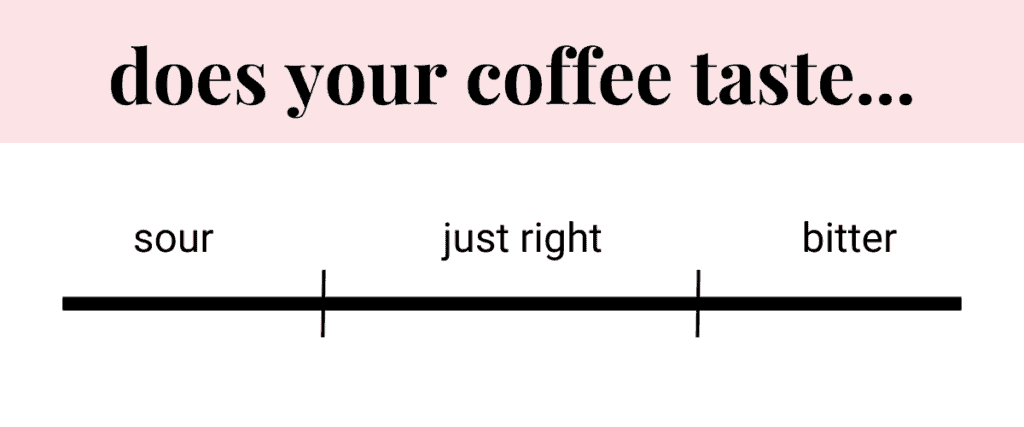
We’re going to talk about three different pieces of the coffee-brewing equation that impact the flavor of the coffee you drink (or gulp) every day:
- Water
- Beans
- Time
By understanding how these three elements affect a cup of coffee, you should be able to brew better, more consistent coffee.
We’ll evaluate each of these variables, starting with sour coffee.
And before we start: I’m not an expert so we’re going simple today –– I’m excited to share what I’ve learned over the past few years about brewing coffee with ya!
Sour Coffee
If your coffee is sour, you’re probably either:
- Under-extracting your beans
- Using low-quality beans
Water
When you strip it back to absolute basics, coffee is made up of two ingredients: water and ground coffee. And when you’re dealing with so few ingredients, getting them right is of the utmost importance when you’re aiming for a drink that tastes as delicious and balanced as it possibly can.
Water is one of those ingredients that is easy to underestimate because it’s an everyday thing. But water quality and temperature are two elements that can make a huge impact on what your final cup tastes like.
Without getting too nerdy, water pH, mineral content, and “hardness” are all potential culprits of off-tasting coffee, so if you’re looking for an easy way to level-up your coffee, use filtered (or soft!) water. I get all of my “coffee water” out of my Brita filter versus simply getting it from the tap.
An important note if you’re using a coffee pot or machine (especially if you have hard, minerally water): be sure you’re descaling or cleaning the pot/machine regularly to take care of any mineral build-up.
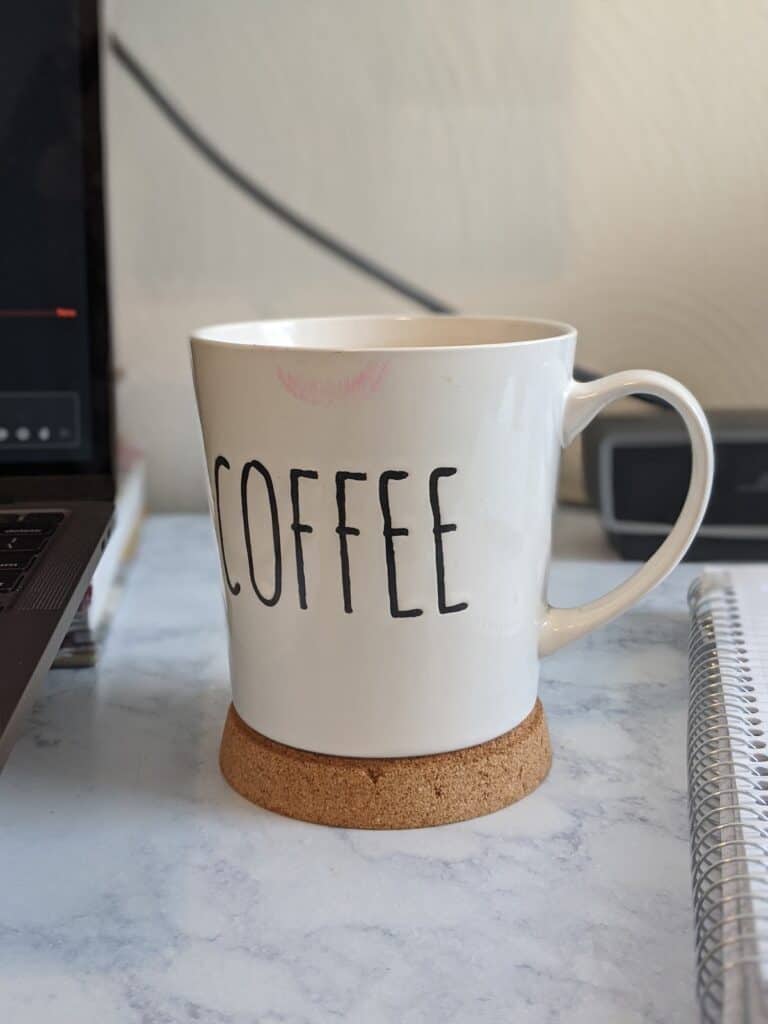
Water temperature also plays a huge role in the final flavor of your coffee. If your water is too cool, you’re going to under-extract the flavor from your beans, resulting in a weak, unpleasant flavor.
You have more control over your brewing temperature with brewing styles where you’re pouring your water directly from a kettle (fitted with temperature controls or a gauge) onto your coffee grounds (think: pour over, French press, or AeroPress). That said, a lot of coffee pots (like the one I have) allow you to control the brew temperature as well!
The ideal brewing temperature to perfectly extract the flavor from your grounds is in the 195 to 205 degree F range.
Beans
The second of our two necessary ingredients for coffee!
Of course, if you’re using old beans, they may have lost some of that *spark* and punchy flavor that they once had. And that’s because… of air!
In general, roasted coffee beans will start to lose their peak flavor about a month after they’ve been roasted. Depending on where you buy your beans from, it may say the roast date somewhere on the bag like this:
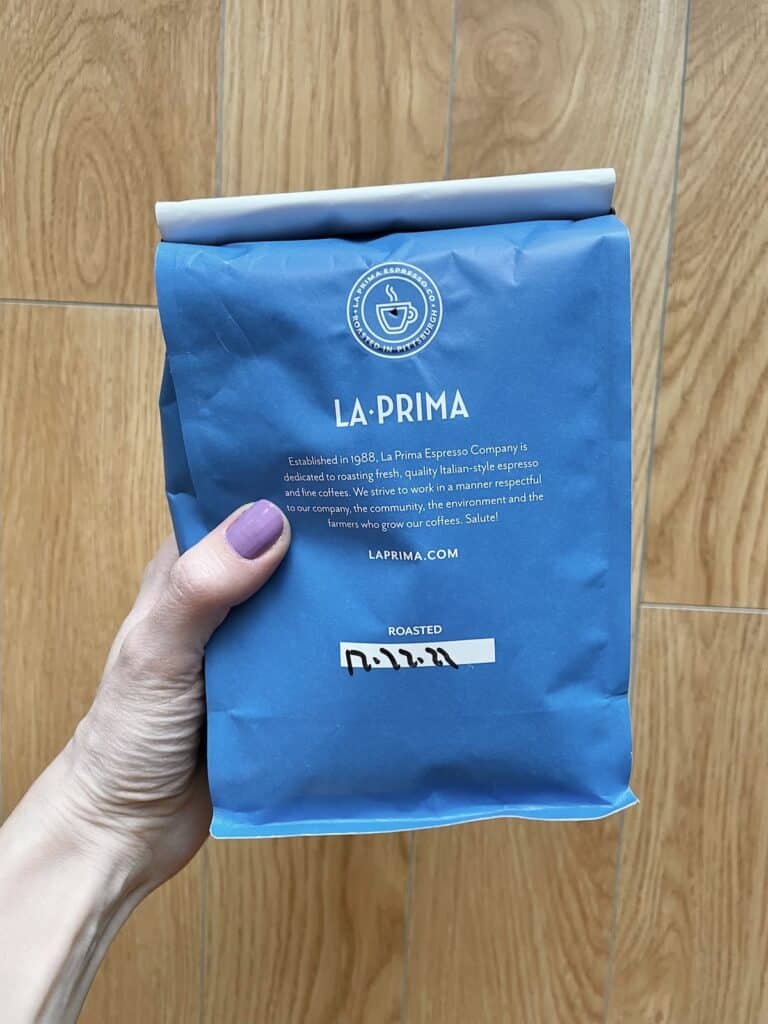
Roast date is one of those things I’ve started paying attention to more and more because the flavor really is so much more pronounced if you’re drinking the coffee shortly after roasting.
Pre-ground coffee can also lose its flavor more quickly since there’s more surface area for the air to reach.
When I can (which is, admittedly, not all of the time), I like to buy my beans from a local shop (like La Prima) to ensure they’re as fresh as possible. Then I grind my beans when I’m ready to make a pot of coffee, not before.
Last, coffee beans that are ground too large for your chosen brewing method can also lead to under-extraction. There are different “ideal grind sizes” for each brewing method –– smaller for things like espresso machines and larger for things like cold brew and French presses.
Brew Time
Similar to how water that’s too cold can cause you to under-extract the flavor from your grounds, if you brew your coffee too quickly, you run the risk of under-extracting as well.
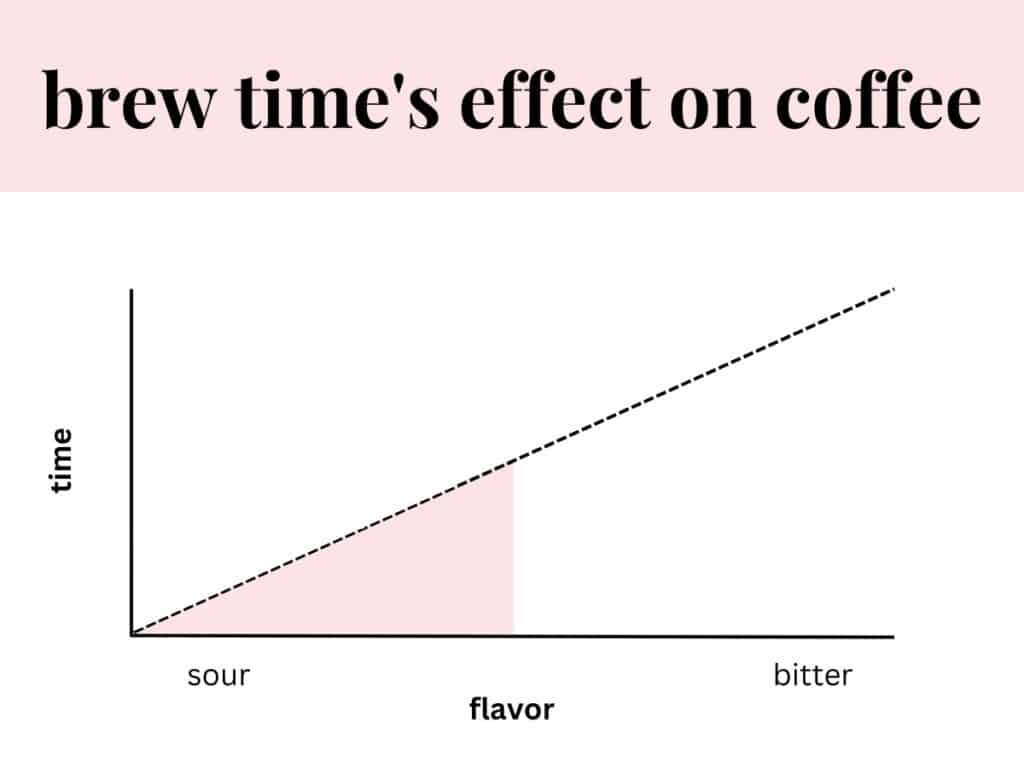
If the amount of time that your water is in contact with your grounds is too short, you’re not going to get as much flavor out of your beans as possible And that can cause your final cup to taste weak, sour, and unpleasant.
Bitter Coffee
On the other hand, if your coffee is tasting too strong and/or bitter, it’s possible you’re:
- Over-extracting your beans
- Using over-roasted beans
And the three elements we already talked about –– water, beans, and brew time –– can all be the culprits of this “off” flavor!
Water
As you can probably guess, water that’s too hot can lead to over-extracting flavor from your beans. Water is a finicky thing, especially if you’re not used to paying attention to the temperature before you brew.
Again, you’ll want to aim for that 195 to 205 degree F range and make sure you’re using filtered water if you want to eliminate this variable in your brewing process!
Beans
If you buy beans regularly, you probably know that there are a bunch of different types of “roasts” available like light roast, medium roast, dark roast, Italian roast, and French roast. They all allude to the length of time your beans have been roasted.
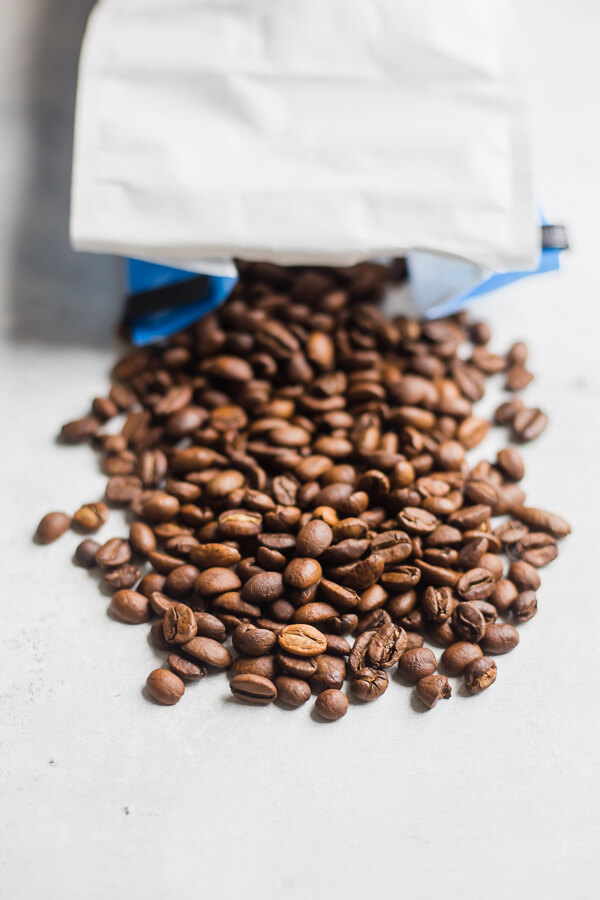
If you’re finding that your coffee is tasting too dark, bitter, and/or burned, see if selecting a light or medium roast fixes the issue.
Most of the time, roast comes down to personal preference –– for example, I love a lighter roast, and my parents always buy dark roast –– so this is a fun element to experiment with!
If your coffee is bitter, you could also be using a grind size that’s too small for your brewing method. Small grind size = more surface area = over-extraction.
Brew Time
If you’ve been tracking with everything so far, you can probably guess where this one is going! Brewing your coffee for too long can result in over-extraction that can make your end cup taste too strong or dark.
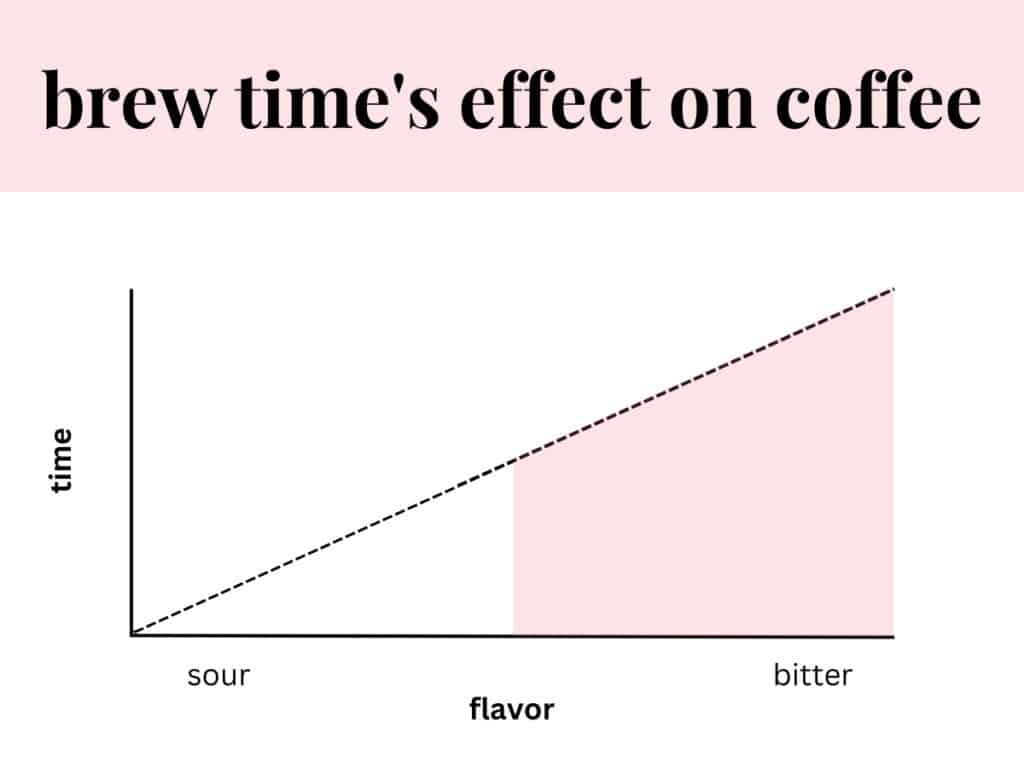
This is easier to control with some brewing types over others. For example, you can easily adjust the brew time when making a pour over or AeroPress, but it might be more difficult to control if you brew with a coffee pot where the brewing process is already set within the machine.
And that’s a wrap! I hope you learned something from this post if you’ve been struggling with brewing coffee at home.
Keep in mind that your coffee’s flavor can be affected by a few of these different elements! Maybe your water is too cold and your grind size is too big. Or perhaps your brewing time is too long and your beans are over-roasted.
I’d suggest changing one element at a time and noting how it affects your final cup. Not only will it teach you how to brew better, more consistent coffee, it’ll be easier to pin-point the cause of its lackluster flavor!
I love my coffee brewing ritual every morning, and it’s a great way to save money if you tend to get your coffee at coffee shops. And once you really nail down the brewing process, it’s possible your home-brewed coffee will taste even better than what you can get elsewhere!
Here’s an at-a-glance cheat sheet for ya if your coffee doesn’t taste quite right in the future. It covers everything we chatted about in this post:
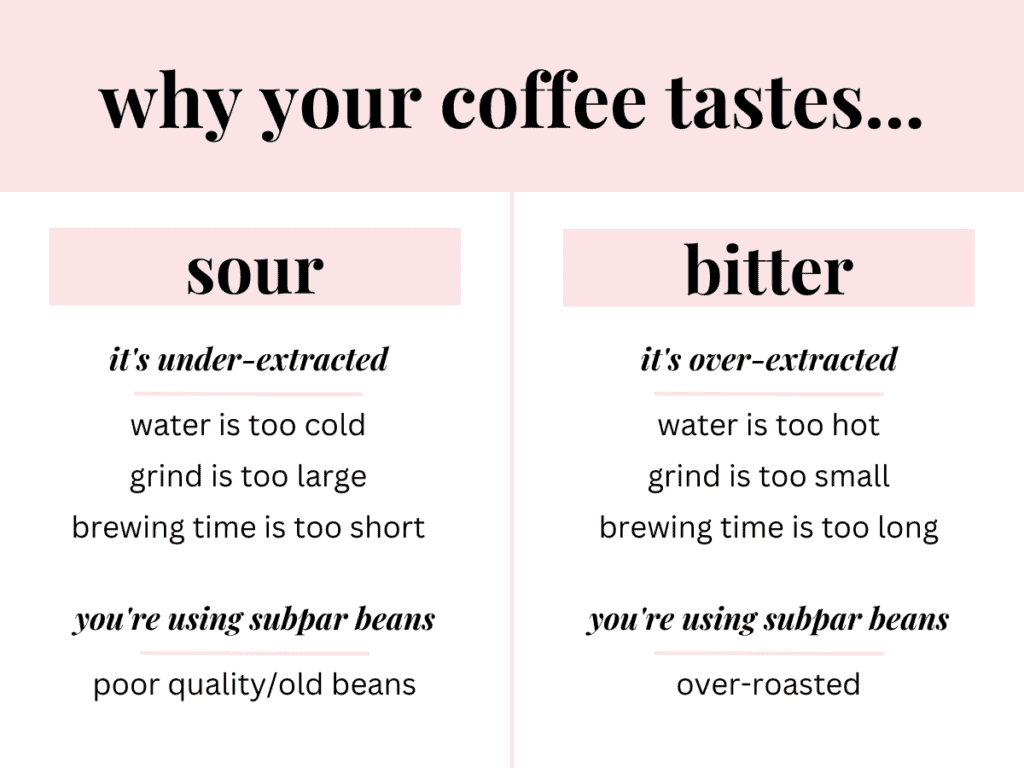
I’d love to hear more about your at-home coffee preparation in the comments below! How does your coffee typically taste? What brewing method do you use? Have you ever tried experimenting with your technique?
Let’s nerd-out about coffee! 🤓



This is a fantastic guide to achieving a perfectly balanced cup of coffee! Breaking down the factors affecting flavor into water quality, bean freshness, grind size, and brewing time makes it easy to understand and troubleshoot common issues like sourness or bitterness.
i want to give up drinking coffee totally. I cannot figure how to make it taste better! I have purchased a new pot, cleaned, rinsed, changed brands (I do not grind my own beans bc I would screw it up), and ultimately gave up my coffee. I don;t know what else I can do.